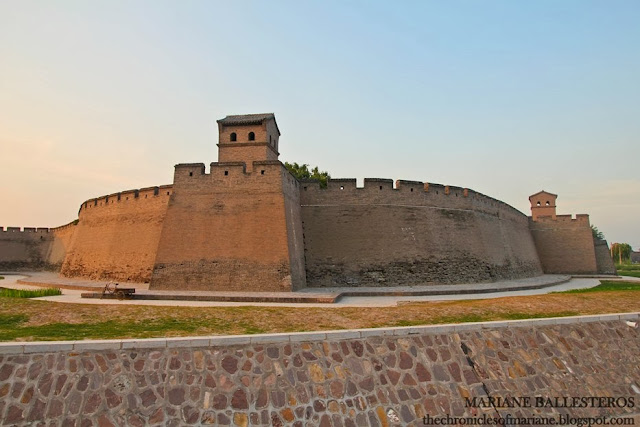 |
| Summer heat and swarming in with hundreds of people, one of the "must experience" at The Forbidden City of Beijing |
Alighting at Tiananmenxi Station by around eight in the morning was not a breeze. Hundreds of local tourists are already swarming around the area excited to tour around one of Beijing's most celebrated attractions. I couldn't believe the hordes of people I saw and I was actually thinking twice whether or not to push through with my plans, but since I was already there, I made it a challenge for myself to still enjoy and appreciate the place even though I could barely move!
 |
| You get to see Mao Zedong before you go in |
 |
| view of Tiananmen Square |
Tiananmen Square
Tiananmen (天安門), literally translated as "The Gate of Heavenly Peace" is said to be the biggest square in the world. Located at the heart of Beijing, one could also reach the Forbidden City through its gate. This place is very significant to China's history due to to the Cultural Revolution and Mao Zedong's proclamation of People's Republic of China in 1949.
 |
| Forbidden City |
Forbidden City
I made my way to the Forbidden City (故宫 Gùgōng), also commonly known as the Palace Museum. For centuries, the 10 meter-high wall of the Forbidden City served as the center of politics and has been the home to 24 Ming and Qing emperors of the Imperial Palace that began its reign during 1406 until 1911 when the last emperor, Pu Yi, was abdicated. It was only opened to public in 1925 and has garnered its spot in UNESCO World Cultural Heritage Sites in China during 1987. It is a great thing that we can now explore this huge cultural site when years ago, commoners were banned from the area.
The huge 200 acre palace complex contains over 900 buildings and 8,700 rooms and for more than 500 years, said to have housed more or less 10,000 people. Only the emperor was allowed to go in the main buildings located in the middle while the ones built on the side were meant for the concubines that were guarded by eunuchs. Just like any other important buildings in China, The Forbidden City was built under strict observance to the Feng Shui.
The lavish lifestyle of the royal family was very interesting. As only the Emperor, Empress, concubines and eunuchs were allowed to live here, human interaction was very limited. That is why the eunuchs were castrated so as to make sure that the emperor only has the “power” to impregnate the empress and the concubines.
Commoners were also not allowed inside the palace’s premises. If you try so, you will be punishable by death, and knowing the Chinese, they had those extreme torture equipments similar to what I saw in Pingyao, those stuff will allow you to experience your slow and painful demise. Yikes!
I thought that the structures appear to be quite similar and there was no way I could differentiate the buildings I saw. I also noticed that almost all sections are closed to public which I thought was odd as one can never really see the functions of these rooms and buildings. As I just came from Korea several months ago, and seeing so much Chinese architecture during my 12-day trip, I was slowly experiencing palace fatigue... The heat and the crowd just made the feeling worse (no clouds and trees to give shade from the scorching heat of the sun).
To my salvation, I was able to discover the lovely gardens by the end of the city. Though of course, still very crowded, seeing trees (finally!) and some lovely rock man-made formations were a breath of fresh air.
Frankly, I did not enjoy the Forbidden City as much as I would have hoped, though it was still interesting to note the uniqueness of Chinese Imperial culture. I wish I could visit again on a winter weekday next time.
How to go to Tiananmen/Forbidden City:
Take metro and get out at Tiananmenxi or Tiananmendong station. Enter from Tiananmen Gate to proceed to Forbidden City.
More of China here

























.jpg)
You've been everywhere! I want to be everywhere too!
ReplyDelete